Publications
Share


Peer-reviewed Papers
This report estimates this sea-level rise commitment and find that pledged emissions until 2030 lock in one metre of sea-level rise in the year 2300.

Peer-reviewed Papers
This study reviews the climate change–impact literature and provides evidence of the impacts of warming at 1°, 1.5°, and 2°C—and higher—for the physical system, ecosystems, agriculture, and human livelihoods.

Peer-reviewed Papers
This study assesses the changes in the contrasting hydrological regimes of certain Himalayan watersheds and subsequent water availability in Pakistan under 1.5 °C and 2.0 °C pathways.

Briefings
This briefing lays out the key findings of the IPCC SR15 that inform governments in their task to develop and submit long-term low emission sustainable development strategies, and inform the continuous scaling up of near- and mid-term action and targets, including in Nationally Determined contributions (NDCs), in line with the ratcheting-up mechanism enshrined in the Paris Agreement.

Briefings
Australia National University’s claim that the “electricity sector is on track to deliver Australia’s entire Paris Emissions reduction targets five years early” does not stack up.

Reports